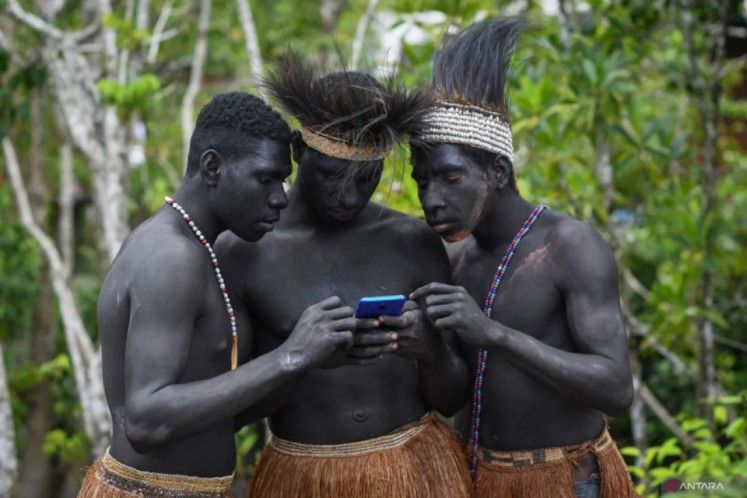Popular Reads
Top Results
Can't find what you're looking for?
View all search resultsPopular Reads
Top Results
Can't find what you're looking for?
View all search resultsConsumers’ demand compels private sector to adopt SDGs all the way
A survey found that 74 percent of Indonesian consumers preferred socially conscious brands and a further 83 percent demand more brands to create a positive impact in the community.
Change text size
Gift Premium Articles
to Anyone
 Green energy for a brighter future: Indonesia’s state-owned electricity company PLN is running a campaign titled PLN Go Green and Sustainable, in line with the nation’s pledged commitment to reduce carbon emissions for the sake of a healthier environment and sustainable development for people across the archipelago. (Shutterstock/Krisana Antharith)
Green energy for a brighter future: Indonesia’s state-owned electricity company PLN is running a campaign titled PLN Go Green and Sustainable, in line with the nation’s pledged commitment to reduce carbon emissions for the sake of a healthier environment and sustainable development for people across the archipelago. (Shutterstock/Krisana Antharith)
A
s the deadline for implementing the 2030 Sustainable Development Agenda draws near, it’s high time now for the Indonesian corporate world to rethink its entire value chain, including upstream and downstream, to ensure maximum impact to the Sustainable Development Goals (SDGs) achievement in the country.
However, until recently, one barrier to ensuring sustained actions across the board was the lack of a common commitment to incorporating sustainability practices into business operations. This shared understanding has now been formalized with the signing of a memorandum of understanding last week between the United Nations Development Programme (UNDP) and the Indonesian Chamber of Commerce and Industry (Kadin).
The MoU promotes the environmental, social and governance (ESG) compliance by companies and both parties UNDP and Kadin will collaborate to find way to tackle challenges faced by micro, small, and medium enterprises (MSMEs) in meeting ESG compliance due to complexity of reporting standard and high cost.
Furthermore, the MoU reflects commitment to strengthening the ecosystem of MSMEs, as well as preparing businesses to be more resilient in the face of economic and health-social shocks such as the COVID-19 pandemic. The agreement goes beyond sustainability practices as it recognizes the urgency to fill the massive gap in SDG funding by pledging to develop innovative financing schemes such as blended finance and impact investment, among others.
Although Indonesian firms are required to produce SDGs-driven sustainability report, the requirement only extends to the publicly listed firms. Unlisted Indonesia enterprises, particularly MSMEs, which employ 97 percent of the workforce, are not required to declare their sustainability plan, making it difficult for authorities to track their commitment to the SDGs. While this MoU does not legally bind all KADIN members, it is the first of its kind to provide a clear moral obligation for corporations to do the right thing.
This agreement also comes at a crucial time as the country strives to end extreme poverty by 2030, a goal that was reaffirmed by President Joko “Jokowi” Widodo in the recent Presidential Instruction No. 4/2022 issued last June. However, if the financially flushed and powerful private sector was not brought closer to the game plan, this objective may be missed.
But are Indonesian businesses prepared to accept this increased moral responsibility? The response should ideally be a resounding yes, as there is a clear consumers’ demand for businesses to cultivate sustainability DNA.
A 2020 survey of 4,500 respondents in six Southeast Asian countries, including Indonesia, by a Japanese marketing think-tank revealed that 74 percent of Indonesian consumers preferred socially conscious brands and a further 83 percent demand more brands to create a positive impact in the community.
This picture is in line with the global consumer trend that has leaned towards socially-responsible businesses, as evidenced by many consumer surveys. For example, a 2020 global survey by tech giant IBM points out that nearly six out of 10 respondents say that they were willing to change their shopping habit to protect the planet.
The collaboration between UNDP and Kadin has strong potential to catalyze changes in the Indonesian corporate world, due to wealth of best practices, as well as rich networks and expertise which the two entities bring to the table.
Kadin is the umbrella organization of the Indonesian business chambers and associations and businesses. The association has played an influential role in lobbying the direction and policy of Indonesian trade, industry, and services, and the association has a vast network across the country’s 34 provinces.
Kadin is also no stranger to the sustainability agenda in Indonesia. Most recently, the entity has launched its Net Zero Hub program, a platform for corporates, including MSMEs, to share information, expertise, resources, and technologies to become a net-zero entity.
In addition to sustainability practices, many surveys also indicate that socially-conscious consumers also care about ethical issues such as commitment in enforcing diversity, gender equality, and workers’ rights. The MoU addresses those ethical production issues specifically by pushing for the application of human rights practices in business operations.
UNDP Indonesia, in particular, will draw on its experience working with the government to support the application of the UN Guiding Principles on Business and Human Rights (UNGPs), focusing on Human Rights Due Diligence (HRDD) practice.
Implementing this international code of human rights standard in business practices can also be a window opportunity to address a variety of inequalities, including gender biases. Women in particular have been more prone to discrimination and unfair practices at the workplace.
According to the International Labor Organization, women workers often face pregnancy and maternity-related discrimination, and on average, are paid approximately 20 percent less than men across the world.
The path to executing the sustainability commitments as enshrined in the MoU between Kadin and UNDP may be uncharted territory for many Indonesian firms. But as we now live in a period of conscious consumerism, with more buyers deliberately making mindful transactions on ethical and environmentally friendly products or services, moving ahead with sustainability actions makes the most business sense.
***
Norimasa Shimomura is United Nations Development Programme Indonesia resident representative. Arsjad Rasjid is chairman of the Indonesian Chamber of Commerce and Industry.










